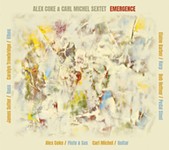Andrew Hill and Greg Osby
Dusk, and The Invisible Hand (Palmetto)
Reviewed by Jay Trachtenberg, Fri., July 28, 2000

Andrew Hill
Dusk (Palmetto)
Greg Osby
The Invisible Hand (Blue Note)
The fact that this is Haitian-born, Chicago-raised pianist/composer Andrew Hill's first album in a decade constitutes a major event for the jazzcommunity. But not because Dusk is going to sell a substantial number of CDs or receive much airplay on conservative jazz radio; rather, it marks the return of a reverential figure whose frustratingly infrequent but delightfully enigmatic and self-styled musical creations over the years have been of remarkably consistent high quality. In particular, his 1964 Blue Note masterpiece, Point Of Departure, is among a handful of defining testaments to that era's modern/avant ethos and remains a source of guidance and inspiration to jazz's progressive musical thinkers to this day. Hill's current group, the Point Of Departure Sextet, not only mirrors the trumpet-two-sax-and-rhythm-section lineup of the original recording, but reflects an evolved spiritual kinship to the music as well -- a live 1998 performance at a NYC jazz festival by this group was described as "the musical equivalent of a perfect game in baseball." Here, Hill's
idiosyncratic compositions, with their often dense textures, quirky time signatures, and disarming lyrical and harmonic beauty, provide a framework for what is, at its core, a profoundly interactive group recording. The music unfolds delicately and organically in graceful, then exciting and unexpected, ways, posing challenges one moment and providing exhilarating rewards the next. In this regard, the title track is as fine a piece of music as anything to be heard this year. Likewise, the album as a whole is filled with one sublime passage after another. We are also treated to a pair of contemplative solo piano pieces, "Tough Love" and the closing 51-second "Focus," which offer insight into the unadorned essence of Hill's music. It's been a long wait, but Dusk marks his return as one of the jazz events of the new century. Hill also appears in an exceedingly rare sideman role on alto saxophonist Greg Osby's latest, The Invisible Hand, as a much younger Osby appeared on Hill's last two Blue Note albums a decade ago. The pianist contributes two tunes here, including the aforementioned "Tough Love," heard in a more fully fleshed-out rendition. Osby cites Hill as his most profound influence as a composer, and two different takes of Osby's reflective sax/piano duet "The Watcher" illuminate his point. But there is much more to this album than merely an Osby/Hill love fest. At the forefront of today's most creative young players, Osby, to his credit, has also enjoined the talents and wisdom of guitar legend Jim Hall, with whom he's been performing and recording of late. Hall is making his first appearance in a supporting role since the mid-Sixties and, along with Hill and a trio of the saxophonist's young contemporaries, forge a rarely envisioned multigenerational ensemble whose chemistry is far more electric than you might first imagine. The whole tenor of the set is one of thoughtful but restless restraint; it feels like reading a novel with a paucity of overt physical action but loaded with rich, intricate, and colorful character development. There's plenty of drama here that tends to simmer rather than explode. Osby's usually jagged and edgy alto is probing yet tempered in the presence of these elder statesmen. And as the title implies, an 'invisible hand' seems to guide this music to some intrinsically beautiful places.
(Dusk) ![]()
![]()
![]()
![]()
(Invisible Hand) ![]()
![]()
![]()
![]()










